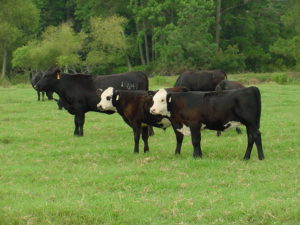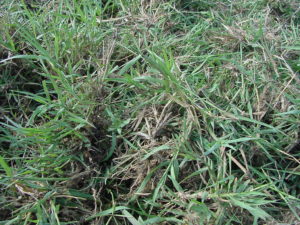Most people think these forages are a species of their own. But they are not. They are hybrid varieties of Bermudagrass (Cynodon dactylon).
Bermudagrass is a warm-season perennial grass that spreads mainly by rhizomes (underground stems) and stolons (horizontal aboveground stems). The grass tolerates a wide range of soil types and soil pH values, thus making it adapted to most of the southern US.
‘Coastal’: A hybrid between ‘Tift’ bermudagrass, a vigorous growing bermudagrass found in an old field near Tifton, Georgia, and an introduction from South Africa. Coastal is a result of an extensive breeding program by Glenn Burton,
USDA-ARS, Georgia Coastal Plains Experiment Station at Tifton, GA, and was released as a variety by that station in 1943. Coastal is a highly productive bermudagrass producing both rhizomes and stolons and is adapted to a wide range of climatic conditions. It has exceptional longevity, readily responds to fertility and irrigation, and possesses better drought tolerance than common. Coastal is also tolerant of heavy grazing pressure or frequent and close defoliation. Coastal is the most widely planted bermudagrass in Texas.
‘Tifton 85’: Tifton 85 was developed by Dr. Glenn Burton of the USDA-ARS in cooperation with the University of Georgia Coastal Plain Experiment Station, Tifton, GA in 1991. Tifton 85 is a hybrid between a plant introduction from South Africa and ‘Tifton 68’. Tifton 85 has large stems, long stolons and a reduced number of rhizomes compared with Coastal. Tifton 85 can be established either by planting sprigs or vegetative tops. In a 3-year trial in GA, Tifton 85
produced 26% more dry matter and was 11% more digestible than Coastal. Animal gains are approximately 25% better than Coastal due to the higher digestibility. At Overton, Texas, Tifton 85 has remained green longer into the season than Coastal
‘Jiggs’: Jiggs is a private release of a bermudagrass found growing along the Texas Gulf Coast. Jiggs establishes rapidly and is generally planted using tops. The naturalized ecotype is productive and anecdotal evidence suggests that Jiggs may perform better on tighter soils that are poorly drained than other bermudagrass varieties. There is no difference in nutritive value between Jiggs and Coastal. Little information is available regarding Jiggs, but the variety has generated a good following where it is used.
If you are not sure which variety is best for your location and production system visit with your local County Extension Agent for region specific recommendations.
Vanessa Corriher-Olson
Professor, Forage Extension Specialist
Soil & Crop Sciences
Texas A&M AgriLife Extension, Overton,TX
903-834-6191

